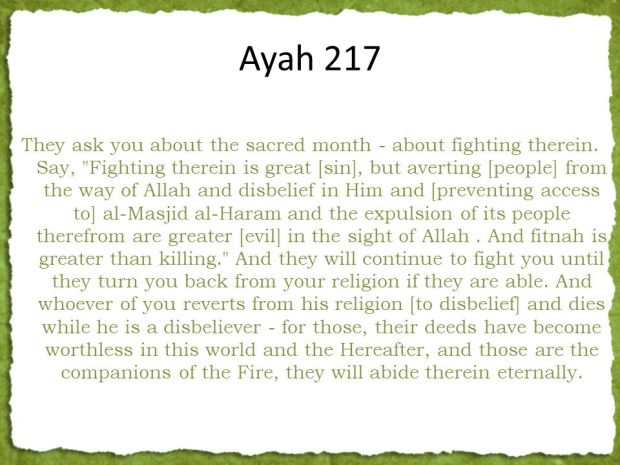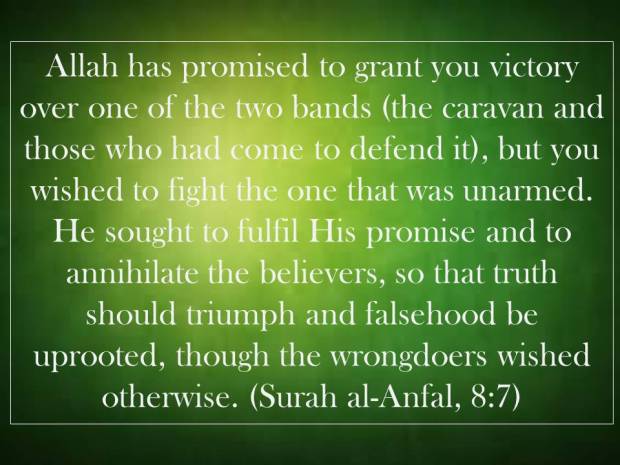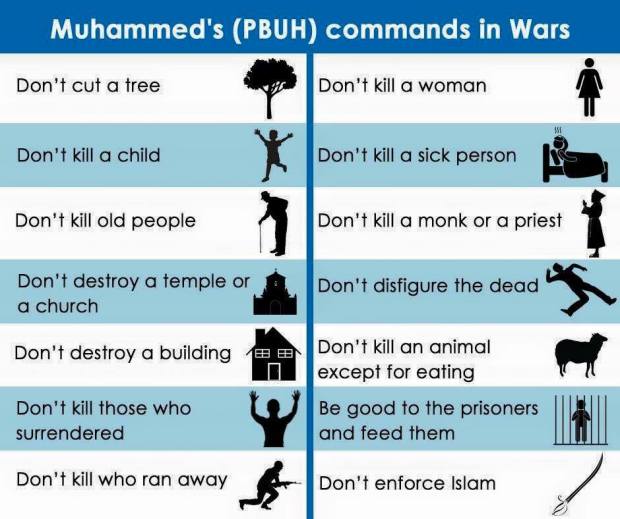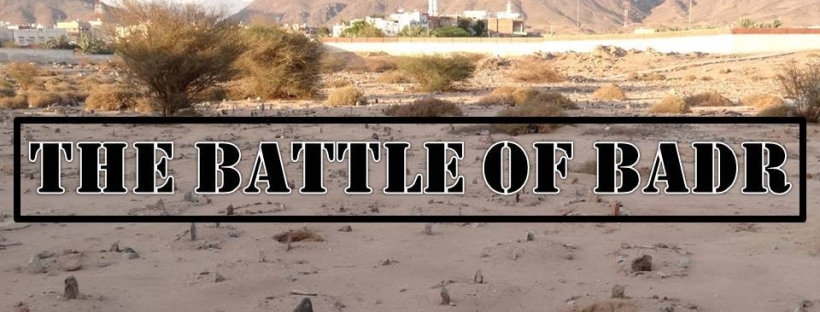If you haven’t read Part I, click here – Jihad Series I – First Verse of Jihad.
We’ve all heard about how Islam was “spread” by a sword. This happens to be a very popular belief, especially in the Indian sub continent. Though this remains a disputed topic, what is funny is that most people can’t seem to decide whose sword it was that spread Islam. Was it Mohammad’s ? Or did it belong to Muslim invaders, who primarily viewed India as means to expand their wealth ?
Because you are already reading a post titled ‘First Battle of Islam’ , it would be stupid to say that Mohammad never really used his sword. This series is an attempt to talk about why and when his sword was used. And we begin from where we left of. Which is post migration, with an ongoing conflict between the Muslims and the pagan tribe of Quraysh.
BACKGROUND :
One of the major events directly preceding the Battle of Badr, was the raid that led to violence and blood in Rajab, a month that was sacred to all Arabs. In 624 AD, sometime in January, Mohammad had dispatched a group of eight men to Nakhlah, to collect intel on the Quraysh. Upon being discovered (despite having shaved their heads to mix in with the pilgrims) by a Makkan caravan, the group, led by Abdullah bin Jash decided to attack them, which resulted in the killing of one man. Abdullah bin Jash even took two men as prisoners to the Prophet. An act that was condemned by everyone – including Mohammad. He like his forefathers, believed in truce during the holy month of Rajab.
It was then that Allah sent down another revelation to Prophet Mohammad (2:217). This was God’s way of letting His Prophet know that it was okay for them to have taken prisoners from the Makkan caravan, despite it being the month of Rajab – ridding the muslims of their feelings of guilt.

Meanwhile, in the city of Makkah, Abu Jahl (influential member of the Quraysh) was already in recruitment of an army big enough to kill – lusting for the blood of his nephew, Mohammad. Scores of men were being trained in the art of warfare and simple battle, in Makkah.
PLAN OF THE MUSLIMS :
In March 624 AD, reports were received by Mohammad, claiming the movement of a large caravan from Makkah, along the Syrian road. It was said to be a caravan worth 50,000 dinars – carrying not only gold but also weapons to be used against Muslims. The Quraysh had been planning a war for a while now.
Though they missed it en route Syria, recently received intel helped them plan a seize on its way back to Makkah. They planned to camp at the town of Badr, where the caravan was said to be halting, in wait. And so, on the 8th day of Ramadan, AH 2, 313 men, 70 camels and 2 horses, led by Mohammad, marched out to the town of Badr – preparing for the interception that was about to come.
Not too far away was Abu Sufyan (Chief of Makkah), who was leading the caravan himself, with 1000 camels and 40 men to guard it. News of a potential seize reached him, and he decided to take the longer way back to Makkah, completely avoiding the muslims, thus ensuring the safety of his caravan. He did however send a message to Makkah, informing them of the Muslims’s whereabouts.
This tip-off was exactly what the Quraysh was looking for, an excuse to hunt Mohammad and his “daft” followers. And thus marched towards Badr, an army of almost 1000 – along with 700 camels to help carry weapons. Abu Jahl initially suggested that they should camp at Badr for three days, and recline in their tents with music, wine and dancing women – so as to remind the muslims of the lavish lifestyles they were missing out on. A proud man, Abu Jahl wanted nothing more than to have the world hold them in high regard, know the Arabs as rich and full of valor.
PLAN OF THE QURAYSH :
When they learnt that Abu Sufyan had taken a detour along the shore of the Red Sea, the Quraysh contemplated their plans. Cost of war and unstable ties with associated tribes all over Hijaz were two major issues that raised the most concern. However, the small size of the Muslim army and the prospect of clearing the entire clan out, seemed worth all the trouble. And so they continued their march towards Badr, despite Abu Sufyan’s absence.
Upon reaching Badr, Mohammad decided to send his cousin Ali, along with a team, to scout the wells of Badr, before occupying them. There, Ali encountered three men who were carrying water for a “large army from Makkah”. One of these men had escaped and the other two were taken prisoners. From them, Mohammad learned about the size of the massive army. Headed his way, were 950 men, mounted on 700 camels and 100 horses.
As news reached the Muslims, there was an initial panic. Mohammad however, was the most confused, for the simple reason that he did not want his helpers (the Ansar) to have to fight for his cause , without wanting to. Under the terms of their contract with Mohammad, they remained the right to refuse to fight. Because they were only legally obligated to defend Madinah (and not Mohammad or Islam).
More of the muslims were beginning to get hesitant, after all, they didn’t have the numbers nor arms for battle. It is said that a revelation from God to Mohammad then, eased their hearts.

WAR COUNCIL :
As they began to prepare themselves for the upcoming battle, Mohammad called a council of war. His most trusted companions, Abu Bakr and Umar seemed unsure of fighting. Until a man named Miqdad rose and said, “O Messenger of God, do what God has commanded you to do. We are with you, now and at all times; and we shall not tell you what the Israelites told Moses: ‘You and your Lord should go and fight against the enemy; as for us, we shall stay here, and sit here.’ No, we shall not imitate the Israelites. We shall follow you and obey your orders.”
This eased Mohammad greatly, although not completely for the Ansar were still silent, and he could not, in all morality, expect them to fight for him. A man named Saad ibn Muadh, one of the leaders of the Ansar, realized why the prophet seemed unsure and said, “Oh, Prophet of Allah, I swear to Allah that if you show us this sea and you dive into this sea, we will dive in with you without any hesitation and none of us will return.”
Now with an unrelenting support to back him, he ordered the Muslims to pitch their tents where they were. Until a man named Hubab suggested they moved infront of all the wells except one, which they would turn into a reservoir, providing constant supply to their army and thereby depriving the Quraysh of water.
On the 17th of Ramadan, 2 AH, The Quraysh descended (March 15, 624). On seeing the enemy so close upfront, Mohammad knelt into prayer saying, “O Allah! Should this group of Muslims perish, there will be none left to worship You on earth.”
RULES OF WAR :
The rules of warfare were then announced to all Muslims present on the battlefield, (Later quoted by Abu Bakr, companion of Prophet) – “O people! I charge you with ten rules; learn them well…for your guidance in the battlefield! Do not commit treachery, or deviate from the right path. You must not mutilate dead bodies. Neither kill a child, nor a woman, nor an aged man. Bring no harm to the trees, nor burn them with fire, especially those which are fruitful. Slay not any of the enemy’s flock, save for your food. You are likely to pass by people who have devoted their lives to monastic services; leave them alone.”

THE BATTLE BEGINS:
The battle began in the traditional way – individual duels. From the Quraysh, came the three most powerful men – Utbah, Shaiba and Walid (All from the same family. Two being brothers and the latter being the son). The Muslims sent forth three men from the Ansar, to which the Meccans demanded men of equal status. And thus, Hamza, Obaida ibn al-Harith and Ali ibn Abi Talib (Uncle, cousin and cousin of the prophet).
Walid was the most competent man in battle, in all of Makkah. And facing him was Ali (aka Lion of Allah). The other two pairs, remained stood, watching as the young men dueled. When Ali succeeded in killing Walid, the other 2 pairs charged at each other. Hamza killing his opponent, Utbah. When Obaida had been seriously injured by Shaiba, young Ali attacked Shaiba, killing him in the process. With an empty ground, Ali and Hamza carried Obaida back to the Muslim line, in hopes of tending to him. Obaida ibn al Harith, succumbed to his wounds, becoming the first Muslim martyr in war.
Enraged with this “embarrassing defeat”, Abu Jahl commanded his troops to attack the Muslims. The Muslim strategy remained, to hold their ground until the enemy had spent most of it’s force. Which revealed to be a great tactic, as when the Quraysh had exhausted themselves, Mohammad gave the order to charge, causing deep unrest and panic amongst the Meccans, eventually becoming the cause for his victory.
Some verses of the Quran also mention, that Mohammad asked God to send help, amidst battle. An army of angels was then released from Heaven, in the form of Divine Help, on the land of Badr.
As the Makkans began to panic and flee, Abu Jahl remained firm on his goal – to defeat the monotheists, and forever pin the name of Quraysh to glory. He tried to reorganize his ranks and continue with his attack. Until Abdullah ibn Masud killed him finally, after Muawwidh ibn Afra’ and Muadh ibn Amr ibn al-Jamuḥ had wounded him greatly. Abu Jahl was dead.
This was the final blow to the Quraysh. To see one of their most powerful leaders dead. The Battle of Badr, became the foundation upon which Mohammad mounted his victory into Makkah. It was what disturbed the very base of Makkan politics, causing mayhem among the people. Something that didn’t go unnoticed, was that the followers of Mohammad believed in something SO convincing, that they faced their own kin in battle for it. They did not think twice, before moving to battle, for a man who claimed he had known God, and that there was only One ; contrary to pagan tradition – something they had all learnt collectively, as children.
CASUALTIES :
As the Quraysh lost a total of 70 men, 20 of them being leaders. 22 alone, were killed by Ali, the Lion of Allah. 70 other men were taken as prisoners. The Muslims however, only lost 14 – who were buried within the battleground, and their graves still exist.
With the Muslims having beat a powerful army, such as the Quraysh, co existing tribes around the peninsula became vary of their power, enquiring about their message, and gradually submitting to it – of their own will. Those that didn’t join Islam, knew to keep a close friendship with Mohammad, for their own political gain.
WAR BOOTY :
Never before, had Mohammad seen his people divided until now. They just did not know what to do with the war booty – 150 camels, 10 horses, red velvet, war equipment, Morocco leather, household goods and garments. These were divided equally amongst the Muslims – the Camel of Abu Jahl, being taken by Mohammad, as the commander. And a sword, Dhulfikar, later to be gifted to Ali, was also given to the commander. Two shares were given to the cavalry and one share to the infantry. Shares were also given to 8 people who remained in Madinah because they had been appointed by the Prophet and to those who were martyred in Badr.
CAPTIVES :
Mohammad declared that the captives were to be released in return for a ransom of 4000 dirhams, for each. Some were released for less than 4000, depending on who they were. It was also decided that the captives who could read and write and who could not afford to pay ransom would be released if they taught ten children of Ansar to do the same. Zayd ibn Thabit was one of the children, taught by these men. Thus, the number of the literate people in Madinah increased. Those prisoners who were unable to, were released without any ransom.
The First Battle of Islam, took place on 17 Ramadan, 2 AH, and the Muslims walked into Makkah, six years later.
SOURCES :
Not all imaged used, belong to me. I am extremely grateful to the original creators of these images.
Wikipedia, Islam.org, Battles – Islam.org, Battles of Islam, American Bedu, Islamreligion.com, Warfare History Blog, Radio Islam, Questions of Islam, Daily Beast.
Goes without saying that I have also referred to the Quran and Sahih Bukhari, regarding these incidents. At the end of it all, I am only a human being, trying to reproduce an account of historical events. If you know of something that I missed, or made an error of, please do let me know. Otherwise, only God knows best.

Very well written, a bit longer but difficult to make it short. You made it interesting until the end. Good job.
LikeLiked by 2 people
Thank you so very much ! I always wait for your comment ! 💛
LikeLiked by 1 person
Very well nd keep writing
Nd i can see therez a noor in ur hand that u write nd remember d truth of islam.
LikeLiked by 2 people
Thank you so much ! Please keep reading 😊
LikeLiked by 1 person